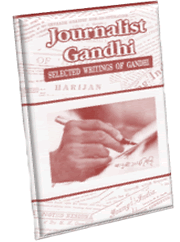
P.O. SEVAGRAM, DIST.WARDHA 442102, MS, INDIA. Phone: 91-7152-284753
FOUNDED BY MAHATMA GANDHI IN 1936
JOURNALIST GANDHI
Selected Writings of Gandhi

JOURNALIST GANDHI
(Selected Writings of Gandhi)
Table of Contents
- ON DEMOCRACY
- ON COMMUNALISM
- ON UNTOUCHABILITY
- ON MORALITY
- ON CASTE
- ON WOMEN
- ON HIS OWN LIFE
- ON RELIGION
- ON SWADESHI
- ON SOCIALIST
- ON CAPITALISM
- ON NON-VIOLENCE
- ON STUDENTS
- ON HIS SON
- ON SOCIAL SERVICE
- ON POLITICS
About This Book
Compiled by : T. K. Somaiya
Gandhi Book Center,
Bombay Sarvodaya Mandal,
299, Tardeo Road,
Nana Chowk, Mumbai 400 007
First Edition : August 1994
Published by : Jitendra T. Desai,
Navajivan Publishing House,
Ahemadabad - 380 014,
India
Printed by : Yash Printers
140/L, Kalbadevi Road,
Mumbai 400 002
India
Download
ON DEMOCRACY
Chapter 2: Civil Liberty
Gurudev has given the poetry of Civil liberty. It bears reproduction in a weekly journal like HARIJAN, although the statement has gone round the world. The reader will find it in another column. It is a paraphrase of "Work out
trine own salvation", or "Man is his own enemy and his own friend".
Civil Liberty is not Criminal Liberty. When Law and Order are under popular control the Ministers in charge of the Department cannot hold the portfolio for a day, it they act against the popular will. It is true that the Assemblies are not sufficiently representative of the whole people. Nevertheless the suffrage is wide enough to make it representative of the Nation in matters of Law and Order. In seven Provinces the Congress rules. It seems to be assumed by some persons that, in these Provinces at least, individuals can say and do what they like. But so far as I know the Congress mind, it will not tolerate any such licence. Civil Liberty means the fullest liberty to say and do what one likes within the ordinary law of the land. The word 'ordinary' has been purposely used here. The Penal Code and the Criminal Procedure Code, not to speak of the Special Powers Legislation, contain provisions which the foreign rulers have enacted for their own safety. These provisions can be easily identified, and must be ruled out of operation. The real test, however, is the interpretation by the Working Committee of the power of the Ministers of law and Order. Subject, therefore, to the general instructions laid down by the Working Committee for the guidance of Congress Ministers, the Statutory Powers limited in the manner indicated by me, must be exercised by the Ministers against those who, in the name of Civil liberty, preach lawlessness in the popular sense of the term.
It has been suggested that Congress Ministers who are pledged to nonviolence cannot resort to legal processes involving punishments. Such is not my view of the nonviolence accepted by the Congress. I have, personally, not found a way out of punishments and punitive restrictions in all conceivable cases. No doubt punishments have to be nonviolent, if such an expression is permissible in this connection. Just as violence has its own technique, known by the military science, which has invented means of destruction unheard of before, nonviolence has its own science and technique. Nonviolence in politics is a new weapon in the process of evolution. Its vast possibilities are, yet unexplored. The exploration can take place only if it is practised on a big scale-and in various fields. Congress Ministers, if they have faith in nonviolence, Will undertake the explorations. But whilst they are doing this, or whether they do so or not, there is no doubt that they cannot ignore incitements to violence and manifestly violent speech, even though they may themselves run the risk of being styled violent. When they are not wanted, the public will only have to signify its disapproval through its representatives in the absence of definite instructions from the Congress. It would proper for the Ministers to report what they consider is a violent behaviour of any member of the public to their own Provincial Congress Committee or the working committee, and seek instructions. If the superior authority does not approve of their recommendations, they may offer to resign. They may not allow things to drill so far s to have to summon the aid of the military. In my opinion, it would mount to Political bankruptcy, when any Minister is obliged to fall back in the military, which does not belong to the people, and which, in any scheme of nonviolence, must be ruled out of count for the observance of internal peace.
One interpretation I put upon the India Act is that it is an unconscious challenge to Congressmen to demonstrate the virtue of nonviolence and the sincerity of their conviction about it. If the Congress can give such a demonstration, most of the safeguards fall into desuetude, and the Congress can achieve its goal without a violent struggle, and also without iii disobedience. If the Congress has not impregnated the people with the nonviolent spirit, it has to become a minority, and remain in opposition, unless it will alter its creed.
Harijan, 23-10-1937